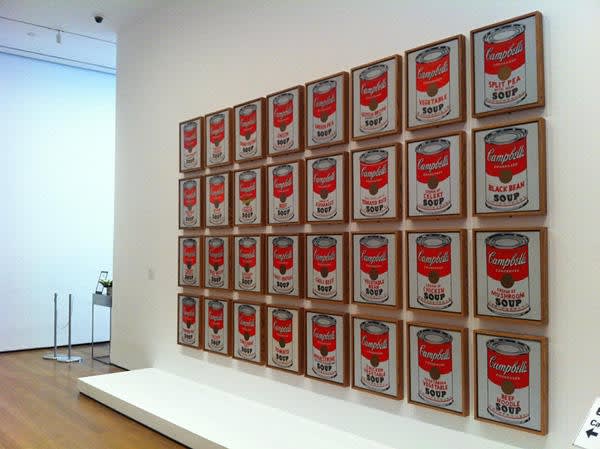
Ah, the Warhol tomato soup can. Nothing quite says "pop art" like a can of soup. It's an iconic image that has been imitated, parodied, and studied countless times. And yet, despite its ubiquity, it remains a symbol of artistic innovation and rebellion.
You see, the tomato soup can is more than just a painting. It's a statement. It's a declaration of Warhol's philosophy that art can be found in the everyday, the mundane, the ordinary. It's a challenge to the elitist notions of high art, and a celebration of the mass-produced consumer goods that define our culture.
And while many other pieces of art have tried to emulate this message, few have succeeded. The "social construction" around most art is fickle and fleeting. It may be lauded by critics and collectors one day, only to be forgotten the next. But for a select few pieces, like the Warhol tomato soup can, the message resonates across time and space.
These pieces become what Nassim Taleb calls "Lindy." They solidify and become real, enduring for centuries while other fads come and go. They are the true classics, the pieces that speak to something universal and timeless.
Of course, the Warhol soup can is not the only piece of art to achieve this status. Artists like Keith Haring, Banksy, and Damien Hirst have also left their mark on the cultural landscape, their Memes of Production becoming part of the pantheon of great art.
But as wonderful as these pieces are, there is a certain irony in their "safe" establishment status. They have become the very thing that they were rebelling against. They are no longer dangerous or subversive; they are the establishment.
So where does that leave us? Well, as the next generation of artists creates their own Memes of Production, we can only hope that they will continue to challenge our assumptions and push the boundaries of what we consider "art." Maybe one day, a can of beans or a roll of toilet paper will be seen as a masterpiece. Who knows? At NADA this journey is what excites us the most, and we can't wait to see where it takes us.
